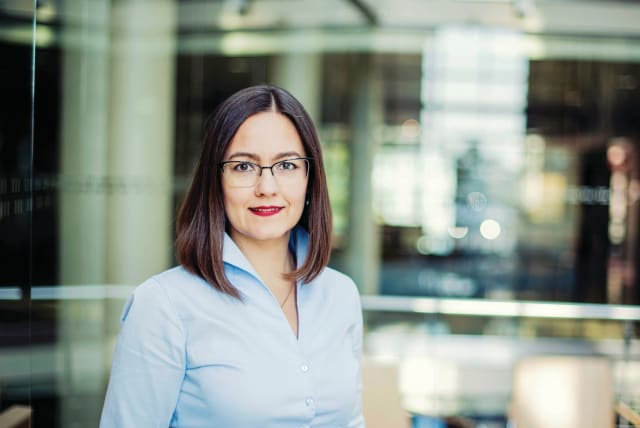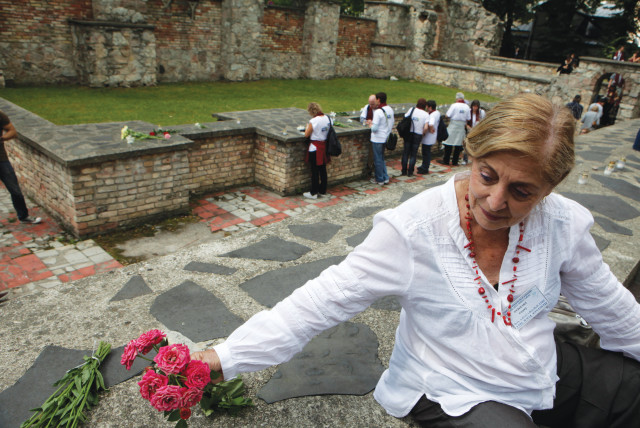There is no antisemitism in Latvia, Riga City Council deputy chair says

Linda Ozola, deputy chair of the Riga City Council, talked to the Magazine about antisemitism, Latvian Jewry and Russia's invasion of Ukraine.
With antisemitic incidents escalating in so many parts of the world, it is heartening to hear that there is no antisemitism in Latvia.
This was the assurance given by Linda Ozola, deputy chair of the Riga City Council, when interviewed in The Jerusalem Post offices.
Ozola was one of many overseas visitors who came to Israel in May to attend conferences, consolidate bilateral relationships and receive prizes.
In her case, she was in Israel for the 17th International Conference on Innovation Crisis Management, which was hosted on this occasion by the Tel Aviv Municipality.
Crisis management and intervention has become a global challenge, with similar conferences taking place on a monthly basis in major cities around the world.
In some countries, crisis situations are provoked by unemployment, the high cost of living, bureaucratic bungling or changes in the retirement age. In others, it is the outcome of extreme nationalism, xenophobia, racism and antisemitism, especially in Europe.
So it was in the cards that the question of antisemitism would be put to Ozola, who was proud to speak of her country as one in which people of different faiths live together in peace and harmony.
Following the interview, that statement and the absence of antisemitism in Latvia were confirmed in a Google search.
This was Ozola’s first visit to Israel, and she did not want to limit herself to the two days of the conference. Instead, she decided to stay for a week to travel beyond Tel Aviv and to meet as many people as possible dealing with security and municipal crises.
She was sufficiently impressed to determine to return and bring her family with her.
Latvia is a small country located in the Baltics, sandwiched between Estonia in the north and Lithuania in the south. It also shares borders with Russia and Belarus.
Latvia’s population of 1.6 million is only a fraction of Israel’s. Its Jewish population numbers slightly in excess of 8,000, and its Muslim population 1,000. Although there are synagogues in Latvia, as yet there is no mosque, though there is a center of Muslim prayer and culture.
Only recently, said Ozola, have there been signs of a Muslim presence in the streets by way of women wearing hijabs.
THE JEWISH community, however, is active. The Shamir organization, headed by Rabbi Dr. Menachem Barkahan, is in the process of building a Holocaust museum in Riga’s old city, at an estimated cost of close to 13 million euros.
The museum, she said, is not only focusing on the past but also looking to the future and to what Jews can contribute to Latvia.
Ozola herself recently discovered a lot more than she had known previously about pre-Holocaust Jewish life in Latvia.
Beitar, a militant Zionist movement named in memory of Yosef Trumpeldor, was established in Riga in 1923 by Ze’ev Jabotinsky. Trumpeldor was among the founders of the Zion Mule Corps, which fought alongside the British in World War I. He also encouraged Jewish settlement in what was then Palestine. Beitar is an acronym for Brit Yosef Trumpeldor, which means “the Trumpeldor covenant” or “alliance.”
A Beitar pilgrimage of members from Israel and elsewhere visited Riga in April to mark the centenary of the movement, and Ozola, who was invited to attend the main event, boned up on Latvia’s Jewish history.
During the Holocaust, 25,000 Latvian Jews were murdered. Many of those who survived moved to Israel and elsewhere.
Ozola is hopeful that the present Jewish population of Latvia will remain. “We really cherish them,” she said, adding “The Holocaust museum will be of great benefit in showing what we lost as a country. It meant losing the entrepreneurial spirit. As a nation, we are culture lovers and invest a lot in cultural heritage.”
Cultural heritage of the Jewish population in Latvia, Russia's invasion of Ukraine
The cultural heritage of Latvia’s Jewish population comes within the scope of that investment. For instance, two synagogues have been restored.
Asked about the restitution of Jewish property, Ozola said that a restitution law that was passed in February 2022 became effective in January of this year and relates to both personal property and community property.
THE MAIN reason for her coming to Israel was to learn more about civil defense and public order and to connect with relevant people in the Tel Aviv and Jerusalem municipalities.
It was important to her to learn about Israeli surveillance methods because “security is very high on the agenda of Latvia after the Russian invasion of Ukraine.”
Attitudes have changed considerably with regard to public safety, which is the responsibility of the municipality.
While it is important for Latvia to learn about security from other countries, it places special significance on what it can learn from Israel “because security is such a high priority in Israel.”
Since Russia’s incursion into Ukraine, “We as neighbors of Ukraine are very alert. Latvia has had a massive influx of people from other Baltic countries, and there is a lot of tension between Latvians and the Russian-speaking population,” she said.
During the Soviet era, more than 50% of the population in Latvia was Russian, and the most widely spoken language was Russian. Today 25% of the population is Russian, but if the Soviet regime had continued, said Ozola, “we would have become a minority in our own country.”
AFTER LATVIA regained its independence, there was the realization that it had not done enough within the education system to preserve its own language and culture.
There are Russian schools in Latvia, where until recently the language used for teaching was Russian. The Latvian Parliament voted on language reform, resulting in the Latvian language replacing Russian as the language of instruction in all schools. Consequently, Russian is taught as a language of culture and literature but is not used as the language of tuition.
Riga has always been an international city in which everyone speaks at least three languages, said Ozola. “But Russian was imposed on us during a period of occupation.”
Fearful that Russia may attempt to once again dominate the Baltics, Latvia is doing everything possible to help Ukraine in humanitarian and military aid.
Latvia has absorbed 44,000 Ukrainian refugees and has provided them with money, transit, food, accommodation, employment and education.
“The attitude in Latvia is that the war in Ukraine is our war,” Ozola said. “We were occupied for 50 years. Russia always looked at us as part of Russia. They killed our people, sent us to Siberia, and all the disasters that Ukraine is experiencing now were done to us during World War II. Every Latvian family lost someone, which is why our country is so ready to support Ukraine in every way we can.”
In an act of solidarity with Ukraine, Latvia has confiscated the cars of drunk drivers, which are then taken to the Ukrainian border. Hundreds of such vehicles have been impounded and sent for use by Ukrainian hospitals and the military.
So far, according to Ozola, there have been 90 convoys in which vehicles were transported for delivery to Ukraine.
This has been motivated by an understanding of what Russia can and will do.
The war opened a window for Latvia, making military service mandatory for men, and voluntary for women.
Latvians did not fight during World War II. According to Ozola, it’s a mistake that won’t be repeated if the need arises.
“Ukraine must win,” she declared. “If it doesn’t, we’ll be next!” ■
Jerusalem Post Store
`; document.getElementById("linkPremium").innerHTML = cont; var divWithLink = document.getElementById("premium-link"); if (divWithLink !== null && divWithLink !== 'undefined') { divWithLink.style.border = "solid 1px #cb0f3e"; divWithLink.style.textAlign = "center"; divWithLink.style.marginBottom = "15px"; divWithLink.style.marginTop = "15px"; divWithLink.style.width = "100%"; divWithLink.style.backgroundColor = "#122952"; divWithLink.style.color = "#ffffff"; divWithLink.style.lineHeight = "1.5"; } } (function (v, i) { });

